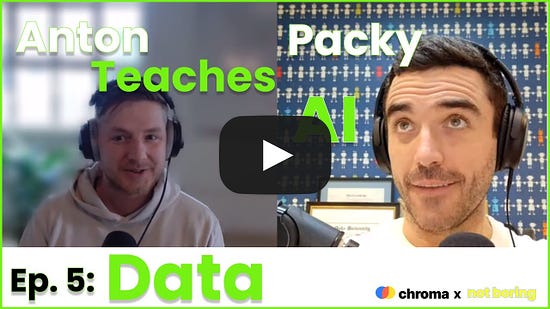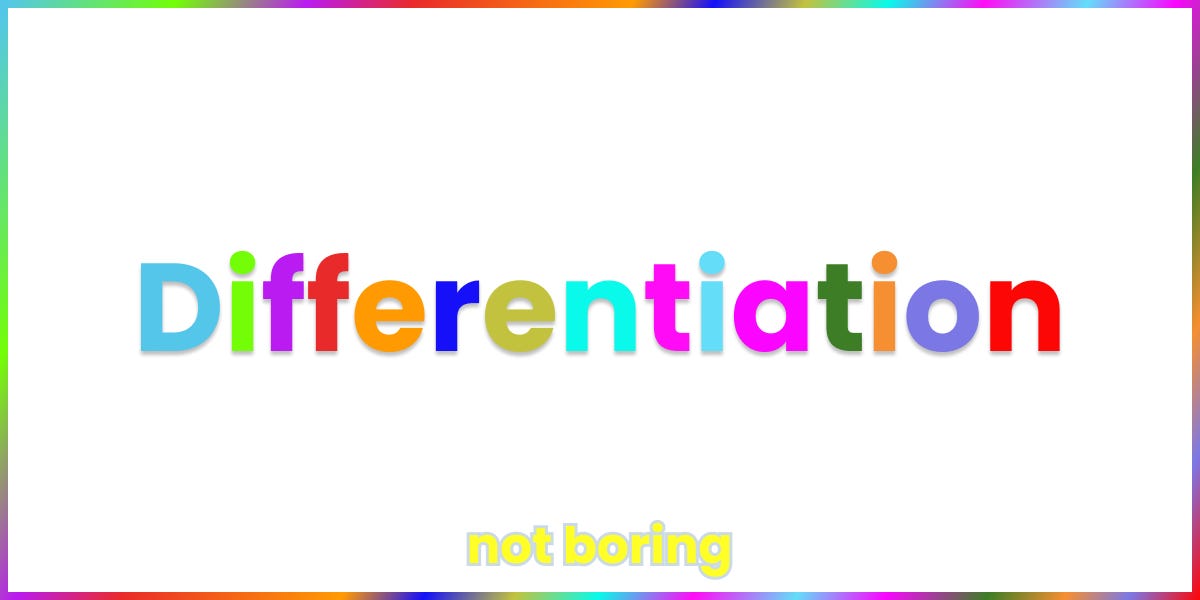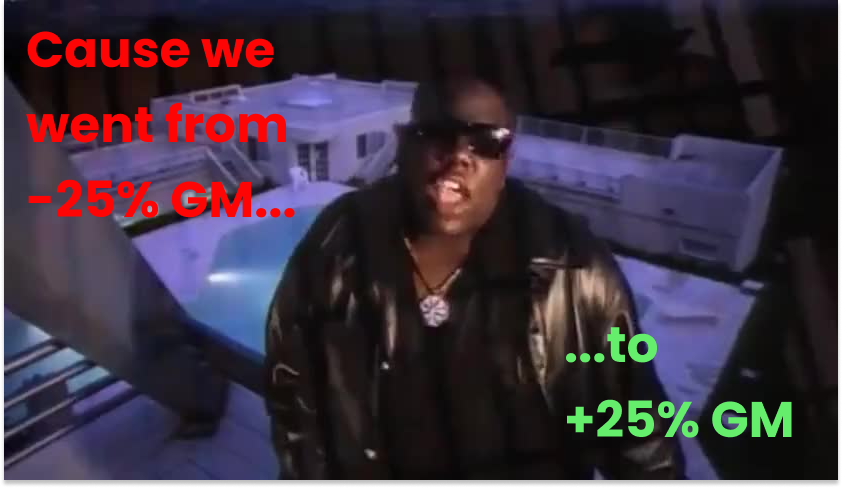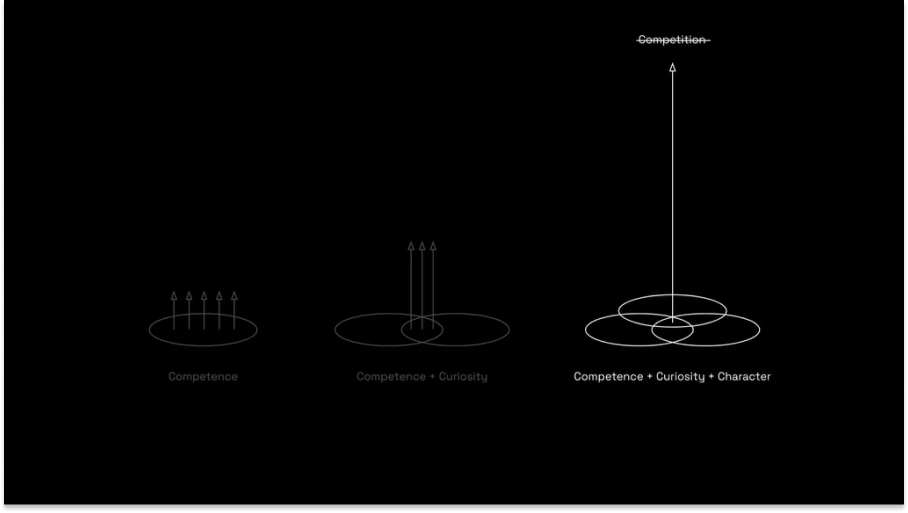Not Boring by Packy McCormick - Differentiation
Welcome to the 836 newly Not Boring people who have joined us since last Tuesday! If you haven’t subscribed, join 181,749 smart, curious folks by subscribing here: 🎧 For the audio version, listen on Spotify or Apple Podcasts Today’s Not Boring is brought to you by… Create (Dan’s new company!) Create is the first modern creatine brand with a first-of-its-kind creatine monohydrate gummy. I know what you're probably thinking...creatine?! Me too. I had the same reaction when my brother Dan first texted me about starting the business. I always associated creatine with bodybuilders and high school football players and bucketed it with “steroids.” But Dan did his homework and showed me the research, and it turns out that creatine is one of the safest and most effective general performance supplements on the market. Andrew Huberman is on the record as taking 5 grams per day. Peter Attia called it "the supplement he feels most confident recommending to patients." The guys who know the most about this stuff view creatine as a table stakes supplement. Here's why:
I now take 5 gummies (5g) per day to boost my recovery and overall performance -- it's part of my morning routine now that I’m running more and I’m old. But I’m biased -- my brother started the company and I'm an investor. Try it out for yourself, 30% off: Hi friends 👋, Happy Tuesday! I hope those of you in the US had a great long weekend. This is an essay I’ve wanted to write for a long time, since I experienced what happens to a company when the differentiation disappears. I’m glad I waited. It’s more relevant now than ever. Let’s get to it. DifferentiationBeing different beats being better, and differentiation’s lead is only going to widen from here. If the last era rewarded conformity and competition, the next one will reward differentiation and cooperation. Quickly, what is differentiation? It’s a big strategy word that you hear a lot. It’s one of Michael Porter’s “generic strategies,” along with cost leadership and focus. These strategies are “generic” because they can be applied to any type of business, big or small, complex or simple. In this context, differentiation means a company’s efforts to distinguish its products or services from competitors’ in customers’ minds in order to charge higher prices and generate higher profits. Instead of competing on cost, you compete on convincing customers that there’s nothing else just like you out there. That definition is part of what I’m talking about, but the differentiation we’ll cover today is more multifaceted than that, it applies beyond running a company, and it’s deeper than convincing customers. The differentiation I’m talking about is doing something that no one else is doing, and that it’s possible no one else can. I’ll start to explain why I value differentiation so highly through three personal stories, and then I’ll explain why I’m finally writing it now, and why I think differentiation will only get more important from here. Ultimately, real differentiation is the only defensible moat left. Three StoriesStory 1: PumpkinsMy Sixth Grade teacher, Mr. Clarke, had a superpower, something that he was better at than anyone in the entire world. Of course, a lot of sixth graders think that their teachers are the smartest, or funniest, or strongest, or whateverest in the world. They don’t know many grownups. But I had proof in the form of two cold, hard Guinness World Records.
Mr. Clarke could carve the shit out of a pumpkin. Every Halloween, he’d show off his superpower to us wide-eyed students, and we’d all stare in wonder, duly amazed. But we were just the warmup. Mr. Clarke carved pumpkins on the local news. Mr. Clarke carved pumpkins on the Today show. One time, in 1999, the inventor of the internet, Al Gore, hired Mr. Clarke to carve pumpkins for his Halloween party. I remember being awed, by the pumpkins of course, but more importantly, by the fact that if you were the best in the world at anything, it could take you places. Or, as Mr. Clarke put it in an October (it’s always October) 2019 interview with Yahoo!:
My grade school didn’t offer business classes, but those pumpkins were my first lesson in differentiation. Find something you’re great at, even if it feels small, and maximize it. Story 2: BreatherNow, let me tell you my Breather story. This one’s about what happens when differentiation dies. Before Not Boring, I worked at a startup called Breather. Breather was Rube Goldbergian in its operational complexity. We leased office spaces, did construction, furnished them, rented them out through an app for as little as 30 minutes, gave customers access via ever-changing door codes, priced them dynamically based on demand, and cleaned and refreshed them after every reservation. It was weird and hard. No one in their right mind would run a business like Breather, but that was the advantage. Breather’s weirdness was beautiful. Breather was differentiated, and that came with a bunch of benefits:
There was just one problem: our gross margins were shit. Different doesn’t necessarily mean good. Four years in, we had expanded our real estate portfolio too quickly, had a bunch of spaces that sat empty day after day, and those spaces dragged our portfolio-wide gross margins to something like -25%. Not good! Something needed to change, so one Christmas break, Ben Rollert (now the CEO of Composer) and I worked on a plan. WeWork was the 800 lb gorilla, offering monthly workspaces for individuals and small teams. Knotel was the brash newcomer, spending recklessly on a monthly office product that felt like a real office instead of a glass box. Where did Breather fit in? The plan we came up with was even more operationally complex and weirder than our original model. It leveraged on our strengths (and our biggest weakness):
We would use dynamic pricing and fill-rate projections to put a monthly price on all of our spaces, and let market dynamics work their magic. Our less popular spaces could be had for cheaper than competitors’ because they were going to lose us money anyway, and when they were filled by the month, demand got pushed to more popular spaces, turbo-charging their margins. Our more popular spaces could be rented at above-market prices, locking in margins and once again redistributing demand to other hourly spaces. On top of the monthly product, we created a richer offering than WeWork or Knotel could that we viewed as a living, breathing network of spaces that could fill the different needs customers had at different times. All of this was really complex – to explain to customers, for one thing, but even just to execute. We essentially bolted a second business onto the first, and needed to change the way we did practically everything, layering complexity on complexity. It was really fucking hard, but it was exhilirating. The company rallied behind the evolution. There were a lot of late nights and gong rings. We were doing something that no one else was doing. The difficulty was worth it, because the result was a differentiated product. And it worked! In less than six months, our portfolio-wide margins across our ten markets, as Biggie would say, went from negative to positive. Specifically, we went from -25% gross margins to +25% gross margins. If differentiation is ultimately expressed in higher profits, our differentiation was finally paying off. At this point, after being promoted to VP of Product and VP of Experience, respectively, the Board put Ben and me in the Office of the CEO. For our first board meeting, we put together what must have been one of the most complex board decks in history to explain what we were doing and why it was working. We were so proud. Our Board members smiled and nodded along. Turns out, they were grinfucking us until they could find an adult to put in the CEO slot, one who could simplify the business enough to make it profitable at the company level. They found their guy, and when the new CEO came in, he got to work simplifying. As two examples:
With each move, we started looking more and more like WeWork and Knotel, but the smaller, poorer version. Our differentiation dissolved by the day. Here’s a sampling of spaces available on the Breather website right now: Any business strategy textbook will tell you that, especially when you’re the third or fourth biggest player in a competitive market, the worst move is to compete directly with the bigger competitors, to try to play their game better. But first-hand experience taught me all of the less discussed ways that being undifferentiated impacts a company. We went from being product-led to being sales-led. When you’re selling the same thing as everyone else, the only ways to win are by lowering prices or … selling better than everyone else? This has a bunch of its own negative consequences, like letting sales dictate the design of spaces, making overly big concessions for customers, and putting burdens on the Ops team that would hurt the product downstream. Plus, salespeople were commissioned on monthly sales, so we sold even our most profitable hourly spaces monthly, at prices too low to make sense. We cut costs in a way that hampered our ability to grow the top line. If you have to compete on price instead of differentiation, you need to cut costs. Pretty basic. But that also meant that we offered a worse product than our competitors, who had much more funding and could afford to eat losses when they were being valued on top line growth, kicking off a downward spiral. We went from an abundance mindset to a scarcity mindset, focusing on what we were doing worse than competitors instead of what we could do to double-down on our strengths. That created a culture of blame. Employee morale plummeted. It’s easier, even fun, to do something hard when you believe you’re doing something that no one else can. It’s really hard to go to work every day to build the same thing, or an even worse version, of what others are already building. As a result, there was a huge talent drain from the company. I left at the end of 2019. These are obviously just my views of the situation. Forces beyond Breather’s control certainly hurt the company’s prospects. WeWork’s botched IPO in 2019 froze the funding market for anything that looked like WeWork. COVID froze the office market completely in 2020. And in May 2021, after raising over $120 million, Breather was sold for parts to Industrious for $3 million. Maybe the new strategy would have worked in a different market environment. I might like complexity a bit too much. But having to go into work every day and face my team after the magic and motivation had been sapped from all of us taught me that differentiation is as important internally as it is externally. Simply put, better people will work harder for something they believe is unique and valuable. Story 3: Personal MonopolyI’ve told this third story before, although maybe not through this exact lens, so I’ll tell the quick version now. During my last year at Breather, when I no longer had the complex problem of building a differentiated network to chew on, I decided that I wanted to start writing again. I’d written a couple of blog posts and stashed them in my Medium drafts folder, but I wanted to do it more regularly and actually publish, so when I saw David Perell’s Write of Passage course on Twitter, I signed up. The course worked. It forced me to write every week, gave me a community of people who were also trying to start writing, and taught me some useful tips and tricks. The most useful of those was the concept of the Personal Monopoly. The Personal Monopoly is the intersection of the things you’re good at, the things you’re curious about, and your own personality. As David describes it:
When I started writing, I had no idea what my Personal Monopoly was. I knew that I was decent at and very curious about tech strategy, but Ben Thompson had already been writing Stratechery for seven years and was better at it than I could hope to be. I tried a bunch of different things, like Philly Sports x Education x Internet, but they didn’t quite work. Then I realized that most strategy writing is very serious, and I’m not. What if I combined tech strategy with pop culture and a dash of my own personality? The first time I hit on the intersection was in a piece called Startup Economic Lessons From Shen Yun’s Empire. It combined my experience at an on-demand startup with a little bit of my economics degree and interest in strategy with Shen Yun. It was a piece that Ben Thompson couldn’t, or at least wouldn’t, have written. When I started writing Not Boring full-time a year later, my first essays lived at the intersection of tech strategy and pop culture: Jeff Bezos’ Fashion Flex, Schumpeter’s Gale, Wackos and ZoomGlüts. The intersection forced me to differentiate, and over time, as I’ve dropped the direct pop culture references, I’ve tried to maintain my unique, less serious voice. Not Boring’s growth has been a result of that differentiation, and as more people write about startups with a lighter tone, one of my goals in 2023 is to keep experimenting with ways to double-down on the uniqueness. When I started writing, I thought that, if I was lucky, I’d be able to grow this to 5,000 subscribers and buy myself time to find a next job that I really loved. I didn’t think I could build a real business off of the intersection of tech strategy and pop culture. My lesson here is that the internet rewards differentiation in bigger ways than you can imagine before experiencing it. Differentiation Matters More Than EverSo why am I writing about this now? When I first thought about writing this essay, I planned to go deep on all of the unexpected ways differentiation matters for startups, based in part on my experience at Breather. In The Good Thing About Hard Things, I wrote:
There’s also a point to be made that the more playbooks there are, the harder it is to build something profitable or magical by doing it. Average at scale is no longer a profitable strategy, and differentiation within a smaller niche becomes necessary. Things like Replit, Urbit, APIs, and generative AI are only going to accelerate the ease with which people can build something, and exacerbate the challenges for startups building undifferentiated products. Fleshing out where value accrues in this world probably deserves its own post. But I was spurred to write this post now by two great podcasts I listened to last week about the value of differentiation for individuals. I think the lessons generalize to companies as well. The first was Lex Fridman’s conversation with Mr. Beast:
Mr. Beast is the most popular creator on YouTube. His videos routinely get over 100 million views. He recently launched Mr. Beast Burger and Feastables, both of which are already doing millions in revenue. At 51:50, Lex asks his advice for other creators who want to become as big as him, and his response reinforces the value of differentiation.
The only way to really break out as a creator, according to the world’s most successful creator, is by finding your Personal Monopoly. This is true despite, and because of, the fact that there are so many courses, threads, YouTube videos, podcasts, and blog posts about how to become a successful creator. While the nuts and bolts – how to set up a camera, for example – might be useful, the premise is flawed. If you’re following a playbook, you’re already dead. The second was Patrick O’Shaughnessy’s conversation with Gravity Blanket creator John Fio on Invest Like the Best:
The whole conversation is worth listening to – I’d never heard of John before and I almost skipped it, but it was one of my favorite episodes in a while – but one line stuck out: “The things that are going to be valuable are the things you can’t teach or copy.” This sounds almost obvious, and echoes Mr. Beast’s point, but it stands in direct opposition to the way the system is currently set up. Humans spend the first twenty-two years of our lives, and sometimes more, being taught and learning how to copy. Then we take more courses, learn best practices, and apply them. Pre-Internet, being average in a rich enough country was a safe way to ensure that you’d have a decent job and a middle class lifestyle, but the Internet rewards differentiation with outsized rewards. Average is still employable, but the gap between average and differentiated keeps growing. Average may not even be employable for long, though, at least in knowledge work. AI is exceptional at average. If something can be taught, it can learn it better. If it can be copied, it can copy it faster. Of course, there’s a whole economy outside of knowledge work and a good argument to be made for doing a job 9-5, getting paid, and spending the rest of your time with your family and friends. Service jobs aren’t going anywhere any time soon. In fact, one of the biggest surprises in AI is that it’s coming for knowledge workers first. But if you’re reading this, I assume that you’re interested in the kind of work that’s subject to the forces of differentiation. And for that kind of work, at some point in the near future, differentiation is going to be the only way to thrive. Differentiation Is About to Get a Whole Lot More ImportantThe third inspiration for this post was my conversation with Anton on the data on which AI models are trained:  I’d of course like for you to watch the whole thing and subscribe, but I’ll give you the relevant takeaway here. In the current state of the art, models are only as good as the data they’re trained on and the models can’t generate new training data themselves. AI-generated output is based on the data that trained the AI in the first place, so any data it creates will be a regurgitation of the data it already has. That means that humans will need to create fresh data by coming up with new ideas and new explanations of the world in order for the models to improve. There’s a very clear way to see how this could lead to a dystopian future in which the AI hires people to generate new art, music, and ideas to fill in the gaps in its understanding, but there’s also a much more hopeful way to view where this is heading. As the value of things you can teach or copy trends towards zero, the value of fresh new ideas increases. The stage is set for an era of fresh new ideas because the incentives have never been more tilted in their favor. This current internet interstitial is just an appetizer. Today, it’s so tantalizingly easy to copy others, to create undifferentiated products or ideas in the pursuit of doing something, that it’s become the default. Just as AI doesn’t improve with stale, rehashed data, the world doesn’t progress based upon stale, rehashed ideas. We progress, as we evolve, based on mutations. Siddhartha Mukherjee concludes his excellent book, The Gene: An Intimate History, with an acknowledgment of that fact: “We seek constancy in heredity – and find its opposite: variation. Mutants are necessary to maintain the essence of ourselves.” The alpha is being squeezed out of doing the same things slightly better. You need to become a mutant. A few minutes with ChatGPT, despite its flaws and shortcomings, will disavail you of the belief that memorizing things just to memorize them will continue to be valuable. A few minutes with Replit’s Ghostwriter will do the same for your belief in basic coding. Ditto for Lex and writing, or Stable Diffusion and drawing. Memorize, code, write, and draw if you love doing those things, if getting your hands dirty helps you think better, if you’re trying to earn your corpus of basic knowledge the hard way so that you can jump off from a stable base, or if you want to do them differently than anyone ever has; otherwise, don’t waste your time. It will regurgitate better than you ever could. The only answer is differentiation. Call it novelty, creativity, mutation. Follow curiosities down deep rabbit holes and emerge with unique ideas. Partake in vivid and varied adventures to build up a set of experiences that is unique to you. Run away from the areas in which you are average and towards those where you might be special. Start a company because the world needs it, and because if you don’t start that specific company, no one else will. You don’t need to be the world’s best brain surgeon; you might be the world’s fastest pumpkin carver. And when you find those areas where your curiosity, skills, and personality meet, lean in so hard that you create a Personal Monopoly no human or machine can touch. The world will be a richer, more colorful place when more people are freed up to learn, create, and build novel things that only they can. This might be technology’s greatest gift to humanity. By making the competition to be better at someone else’s game practically futile, it frees us up to play different games. Thanks to Dan for editing! That’s all for today. We’ll be back in your inbox on Friday with the Weekly Dose. Thanks for reading, Packy |
Older messages
Announcing Not Boring Capital Fund III
Tuesday, January 10, 2023
A $30 million Fund to invest in Hard Startups and tell their stories
Blank Page
Monday, December 19, 2022
To 2023 and Beyond
Aleo: Can You Keep a Secret?
Tuesday, December 13, 2022
A Deep Dive Into Zero-Knowledge Proofs and the Future of the Internet
Weekly Dose of Optimism #23
Friday, December 9, 2022
TSMC Factories, Our AI in Data, Nano x AI, The Century of Biology, Malaria Antibodies
Four Seasons Total Tech
Monday, December 5, 2022
Winter is Ending in AI, Solar, Nuclear, Space, & Biotech. Summer is Coming
You Might Also Like
Free download: 5 ways to improve your proposals
Thursday, February 27, 2025
A free resource for you ͏ ͏ ͏ ͏ ͏ ͏ ͏ ͏ ͏ ͏ ͏ ͏ ͏ ͏ ͏ ͏ ͏ ͏ ͏ ͏ ͏ ͏ ͏ ͏ ͏ ͏ ͏ ͏ ͏ ͏ ͏ ͏ ͏ ͏ ͏ ͏ ͏ ͏ ͏ ͏ ͏ ͏ ͏ ͏ ͏ ͏ ͏ ͏ ͏ ͏ ͏ ͏ ͏ ͏ ͏ ͏ ͏ ͏ ͏
From living in a car to $1.4M in 5 months
Thursday, February 27, 2025
I love that you're part of my network. Let's make 2025 epic!! I appreciate you :) Today's hack From living in a car to $1.4M in 5 months Taro Fukuyama and 2 of his friends from Tokyo
I'm launching a meme coin live RIGHT NOW
Thursday, February 27, 2025
(All for charity dw) ͏ ͏ ͏ ͏ ͏ ͏ ͏ ͏ ͏ ͏ ͏ ͏ ͏ ͏ ͏ ͏ ͏ ͏ ͏ ͏ ͏ ͏ ͏ ͏ ͏ ͏ ͏ ͏ ͏ ͏ ͏ ͏ ͏ ͏ ͏ ͏ ͏ ͏ ͏ ͏ ͏ ͏ ͏ ͏ ͏ ͏ ͏ ͏ ͏ ͏ ͏ ͏ ͏ ͏ ͏ ͏ ͏ ͏ ͏ ͏ ͏ ͏ ͏ ͏ ͏ ͏ ͏ ͏ ͏ ͏ ͏ ͏ ͏ ͏ ͏ ͏ ͏ ͏ ͏ ͏ ͏ ͏ ͏ ͏ ͏ ͏ ͏ ͏ ͏ ͏
Vibe shift
Thursday, February 27, 2025
Billions added to values as investors warm to sector earnings ͏ ͏ ͏ ͏ ͏ ͏ ͏ ͏ ͏ ͏ ͏ ͏ ͏ ͏ ͏ ͏ ͏ ͏ ͏ ͏ ͏ ͏ ͏ ͏ ͏ ͏ ͏ ͏ ͏ ͏ ͏ ͏ ͏ ͏ ͏ ͏ ͏ ͏ ͏ ͏ ͏ ͏ ͏ ͏ ͏ ͏ ͏ ͏ ͏ ͏ ͏ ͏ ͏ ͏ ͏ ͏ ͏ ͏ ͏ ͏ ͏ ͏ ͏ ͏ ͏ ͏ ͏ ͏ ͏ ͏
Midnight Society Bows Out While ChronoForge Aims for a Bigger Stage 😮
Thursday, February 27, 2025
PlayToEarn Newsletter #260 - Your weekly web3 gaming news
WTF is open-source marketing mix modeling?
Thursday, February 27, 2025
Marketers should be wary of open-source programs promoted by purveyors with a walled garden history. February 17, 2025 PRESENTED BY WTF is open-source marketing mix modeling? Marketers should be wary
👀 What Content Is AI Citing?
Thursday, February 27, 2025
Another parasite SEO gift for you 🧙✨🎩 ͏ ͏ ͏ ͏ ͏ ͏ ͏ ͏ ͏ ͏ ͏ ͏ ͏ ͏ ͏ ͏ ͏ ͏ ͏ ͏ ͏ ͏ ͏ ͏ ͏ ͏ ͏ ͏ ͏ ͏ ͏ ͏ ͏ ͏ ͏ ͏ ͏ ͏ ͏ ͏ ͏ ͏ ͏ ͏ ͏ ͏ ͏ ͏ ͏ ͏ ͏ ͏ ͏ ͏ ͏ ͏ ͏ ͏ ͏ ͏ ͏ ͏ ͏ ͏ ͏ ͏ ͏ ͏ ͏ ͏ ͏ ͏ ͏ ͏ ͏ ͏ ͏ ͏ ͏ ͏ ͏ ͏
The 2021 GTM Playbook Is Mostly Dead
Thursday, February 27, 2025
But What's The AI Era Replacement? To view this email as a web page, click here saastr daily newsletter The 2021 GTM Playbook Is Mostly Dead. But What's The AI Era Replacement? By Jason Lemkin
'Do Your Job: The Art of Winning' with Bill Belichick
Thursday, February 27, 2025
In his upcoming book “The Art of Winning,” set to be released in May, Coach Bill Belichick shares several key secrets to his extraordinary success on the field.
Good Questions
Thursday, February 27, 2025
About Google's Performance Max.







